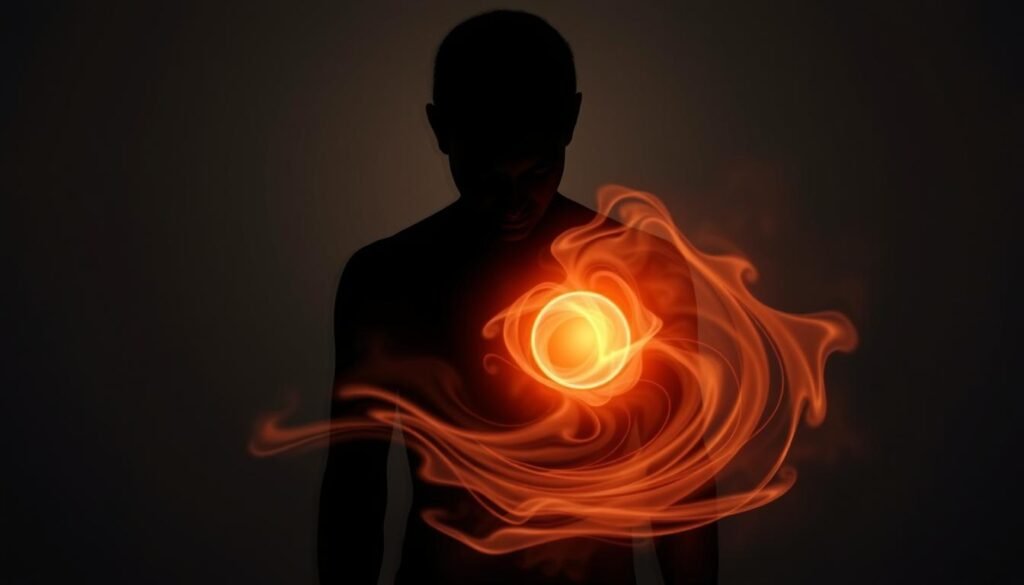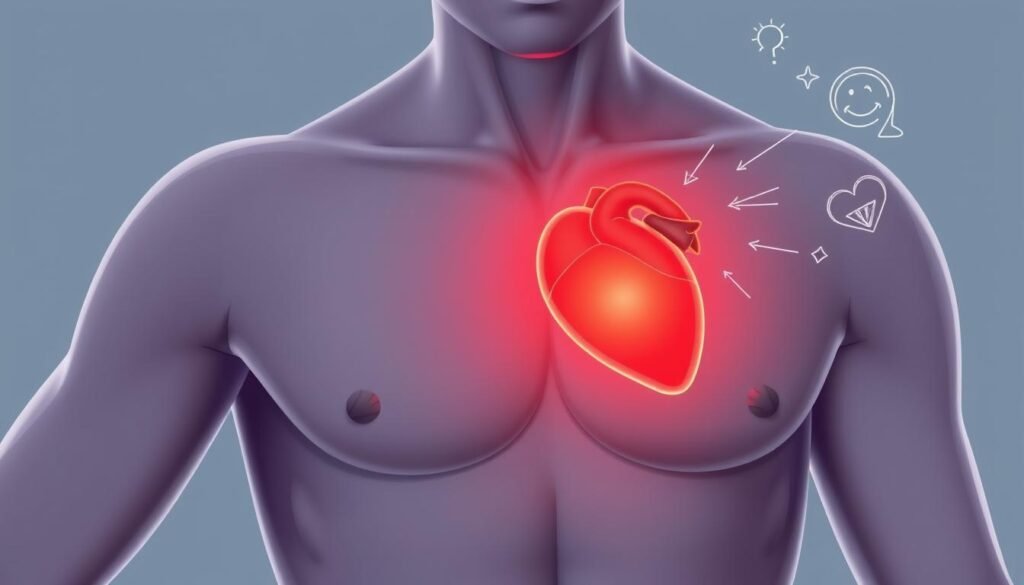Did you know that around 58% of chest pain from anxiety has nothing to do with the heart? This surprising fact shows how common anxiety symptoms can imitate chest discomfort, especially on the left side. Although chest pain can be scary, it often comes from anxiety or stress, not a heart issue.
When we have panic attacks, our brain releases stress hormones such as adrenaline and cortisol. These hormones make our heart beat faster and raise our blood pressure. This reaction can cause chest pain on the left side, often feeling sharp or stabbing. If you often feel this way when anxious, understanding this connection is key. Here, we’ll talk about why anxiety causes chest pain, explain its causes, and show how to ease this troubling symptom.
Key Takeaways
- About 58% of chest pain from anxiety is unrelated to heart problems.
- Anxiety attacks increase heart rate and blood pressure, triggering chest pain.
- Anxiety chest pain typically presents as sharp sensations without radiating to arms.
- Common relief strategies include relaxation techniques and exercise.
- It’s crucial to differentiate between anxiety chest pain and heart attack symptoms.
- Seek medical help if chest pain is severe or accompanied by unusual symptoms.
Understanding Anxiety and Its Physical Symptoms
Anxiety is a common mental health issue. It shows up as ongoing worry, fear, and nervousness. These feelings can cause physical symptoms like heart racing, breathing hard, and chest pain. Studies reveal 25 to 50 percent of people with low-risk chest pain in emergency rooms actually have anxiety.
The body reacts to severe anxiety by releasing stress hormones. These hormones, like adrenaline and cortisol, tighten muscles and can cause chest discomfort. This often feels like a heart problem. You might also sweat, have a fast heartbeat, and breathe quickly.
It’s key to know how anxiety signs link to physical issues. Deep breathing exercises can help when symptoms get intense. Try breathing in slowly for a count of 10, hold it, then breathe out for 10.
If calming exercises don’t work, looking into treatment options is smart. Medicines like SSRIs and benzodiazepines can help with the chest pain from anxiety. Making lifestyle changes, like working out and eating well, also helps ease symptoms. Also, therapies like cognitive behavioral therapy are useful.
To learn more about anxiety and chest tightness, check out detailed studies. This knowledge is vital for those affected and their doctors. Click here to understand more about symptoms caused by.
What is Anxiety Chest Pain?
Anxiety chest pain is a symptom many feel when anxious or having panic attacks. It is usually sharp or tight and stays in the chest, unlike heart pain. People say it feels like a quick stab or like pulling a muscle.
About 30% of chest pain in emergency rooms comes from anxiety. Each year, 7 million Americans go to the ER for chest pain, but not all have heart problems. In fact, psychological issues like anxiety might cause up to 58% of these pains, especially on the left side.
During panic attacks, the heart beats fast, making anxiety worse. Many also breathe too fast, dropping their blood’s carbon dioxide. This affects 1 in 10 who get medical help. Anxiety chest pain is sharp and may also feel tight or heavy.
Here are some ways to deal with anxiety chest pain:
- Deep breathing exercises
- Taking breaks from stress
- Moving your body
- Finding quiet places to relax
These methods ease symptoms and help the heart. If chest pain lasts and you’re not sure if it’s anxiety or something else, see a doctor. Knowing about anxiety chest pain helps people manage better and get the right help.
Anxiety Chest Pain Left Side: Causes and Symptoms
Chest pain from anxiety, especially on the left side, comes from various causes. About 30% of people seeking emergency help for low-risk symptoms feel this pain due to anxiety. It’s tied to muscle tension or quick breathing, often seen in panic attacks. This quick breathing happens in about 1 in 10 people feeling chest pain. It can cause sharp pains.
People might feel tightness, a dull ache, or sudden pain in their chest. Up to 58% of those with chest pain also face high anxiety. Studies show that mental stress can harm heart health over time. It’s vital to know why these symptoms appear. It can be tough to tell anxiety-related chest pain from more serious health problems.
Emergency rooms see 7 million visits for chest pain each year in the U.S., but most cases aren’t heart-related. Up to 25% of adults in the country experience noncardiac chest pain, showing it’s a widespread issue. It’s important to get sudden or new chest pain checked if it lasts more than five minutes. For more information, check out the detailed analysis by medical experts.

Distinguishing Anxiety Chest Pain from Heart Attack Symptoms
Knowing how anxiety chest pain differs from heart attack symptoms can save lives. People with chest discomfort might struggle to tell them apart. Anxiety-related chest pain is usually sharp and specific and often goes away fast. On the other hand, heart attack pain spreads and comes with sweating, nausea, or tiredness. It lasts longer without getting better.
About 3% of U.S. adults experience panic disorder every year. Many feel anxiety symptoms. After the pandemic, it’s especially important to understand chest pain causes. Heart attack symptoms are:
- Chest pain or pressure
- Pounding or racing heart
- Lightheadedness and sweating
- Upper body discomfort
- Shortness of breath and nausea
Panic attacks also cause similar feelings:
- Chest pain
- Racing heart
- Trouble breathing
- Shaking or trembling
Knowing anxiety vs heart attack symptoms is key to getting the right help. Panic attack symptoms fade in minutes to an hour. But, heart attack symptoms last longer and come in waves. If someone has severe chest pain or isn’t sure what’s happening, they should get medical help right away. Understanding these differences helps with health outcomes and reduces worry during panic times. For more on anxiety and heart problems, click here.

| Symptoms | Anxiety Chest Pain | Heart Attack Symptoms |
|---|---|---|
| Duration | Minutes to an hour | Persistent, may last longer |
| Type of Pain | Sharp, localized | Radiating, pressure-like |
| Associated Symptoms | Shortness of breath, racing heart | Nausea, sweating, lightheadedness |
| Emotional State | Fear, anxiety | Feelings of impending doom |
The Role of Stress Management in Reducing Anxiety Chest Pain
Effective stress management techniques can greatly improve how we handle anxiety chest pain. Mindfulness helps by focusing our attention on the present. This reduces overwhelming feelings that come with anxiety. Practices like relaxation exercises and deep breathing calm our stress response.
Adding regular physical activities to our day improves both our body and mind. These activities lessen anxiety symptoms and help manage stress better. Eating well and getting enough sleep each night are key for good health. Drinking less caffeine and alcohol also aids in controlling anxiety.
It’s important to know how to cope with stress triggers. Writing down thoughts or sharing feelings can make stress easier to handle. For more tips, getting professional advice on anxiety management may be useful. Visiting sites like health care professionals offers more help.
Ignoring chronic stress may harm our heart health. It can cause irregular heartbeats, high blood pressure, and other issues. However, maintaining a positive outlook on life can protect the heart. Feelings of happiness, thankfulness, and being in the moment contribute to this protection.

Cognitive Behavioral Therapy and Anxiety Treatment
Cognitive Behavioral Therapy (CBT) is great for treating panic disorder. It helps change negative thoughts. This way, people can think differently and cope better. CBT uses steps to help find stressors and change reactions.
People with panic disorder might use CBT and medicine together. Medicines like SSRIs and benzodiazepines help with symptoms. This makes therapy more effective. Working with doctors to make a treatment plan is key.
CBT is also good for anxiety-caused chest pain. Many say therapy techniques give them relief. CBT teaches how to control anxiety. This reduces chest pain from anxiety.
In short, CBT and the right treatments are hopeful for those with panic disorder. It improves life quality by giving tools to face anxiety.
| Treatment Options | CBT | Medication | Combined Approach |
|---|---|---|---|
| Effectiveness | High for coping mechanisms | Can reduce acute symptoms | Addresses both short and long-term needs |
| Side Effects | No physical side effects | Possible side effects | Depends on medication used |
| Duration | Variable, often brief | Often ongoing | Dependent on individual needs |
| Focus | Cognitive restructuring | Symptom management | Holistic well-being |
Home Remedies for Anxiety Chest Pain Relief
Several home remedies can ease anxiety chest pain. Deep breathing exercises are highly effective. They help by calming your mind and body. Just focus on breathing in through the nose and out slowly.
Calming visualizations can boost your relaxation too. Imagining a peaceful place can shift your focus away from pain. It makes you feel calm. Relaxation apps also help by teaching meditation and mindfulness.
Being active is great for reducing anxiety. Exercise releases endorphins, lifting your mood. Yoga, for example, blends movement with mindfulness, easing chest pain from anxiety.
Nutrition is key for mental health. Eating foods with Omega-3 fatty acids, like fish and nuts, is beneficial. Staying hydrated and sleeping well are crucial too. Avoiding caffeine can also reduce anxiety symptoms.
Below is a table highlighting various home remedies and their effects on anxiety chest pain:
| Home Remedy | Effect |
|---|---|
| Deep Breathing Exercises | Calms the mind, reduces intensity of anxiety symptoms |
| Yoga | Combines physical activity with mindfulness, alleviates chest pain |
| Relaxation Apps | Guides through meditation, provides coping techniques |
| Regular Exercise | Boosts mood, lowers anxiety levels |
| Balanced Diet | Supports mental health, maintains emotional stability |
Using these home remedies along with coping techniques can make a big difference. They help create a balanced lifestyle, offering relief from anxiety chest pain.
When to Seek Medical Attention for Anxiety Chest Pain
Knowing when to get help for chest pain caused by anxiety is key for good health. Anxiety can cause heart palpitations and discomfort. But, if you have severe, ongoing chest pain, see a doctor right away.
This is especially true if the pain comes with hard breathing, feeling dizzy, or sick to your stomach. These symptoms can mean something more serious. In these cases, getting emergency help is very important.
About 1 in 5 people in the U.S. deal with anxiety disorders. These can lead to chest pain that isn’t from the heart. Anxiety chest pain usually goes away fast. But if the pain stays or feels very strong, it could be a panic attack or a heart problem. Don’t wait to get help if your symptoms get worse or feel strange.
Seeing your doctor regularly can spot health issues early. This is crucial for handling anxiety. Considering 25% of people who go to the emergency room for chest pain actually have panic disorder, it’s important to look after your health. Knowing what signs to watch for and acting fast can help you stay both emotionally and physically healthy.